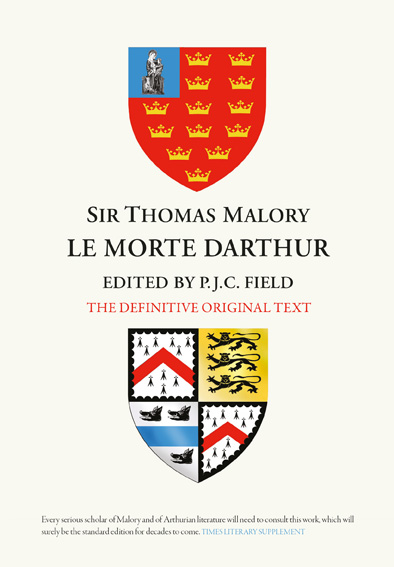Book contents
- Frontmatter
- Contents
- Introduction
- King Uther and King Arthur
- King Arthur and the Emperor Lucius
- Sir Launcelot Du Lake
- Sir Gareth of Orkney
- Sir Tristram De Lyones: The First Book
- Sir Tristram De Lyones: The Second Book
- The Sankgreal
- Sir Launcelot and Queen Guenivere
- The Morte Arthur
- Index of Names
- Glossary
King Uther and King Arthur
Published online by Cambridge University Press: 11 January 2024
- Frontmatter
- Contents
- Introduction
- King Uther and King Arthur
- King Arthur and the Emperor Lucius
- Sir Launcelot Du Lake
- Sir Gareth of Orkney
- Sir Tristram De Lyones: The First Book
- Sir Tristram De Lyones: The Second Book
- The Sankgreal
- Sir Launcelot and Queen Guenivere
- The Morte Arthur
- Index of Names
- Glossary
Summary
UTHER PENDRAGON AND MERLIN
HIT BEFEL in the dayes of Uther Pendragon, when he was kynge of all Englond and so regned, that there was a myghty duke in Cornewaill that helde warre ageynst hym long tyme, and the duke was called the Duke of Tyntagil. And so by meanes Kynge Uther send for this duk, chargyng hym to brynge his wyf with hym, for she was called a fair lady and a passynge wyse, and her name was called Igrayne.
So whan the duke and his wyf were comyn unto the kynge, by the meanes of grete lordes they were accorded bothe; the kynge lyked and loved this lady wel, and he made them grete chere oute of mesure and desyred to have lyen by her. But she was a passyng good woman and wold not assente unto the kynge. And thenne she told the duke her husband and said, “I suppose that we were sente for that I shold be dishonoured. Wherfor, husband, I counceille yow that we departe from hens sodenly, that we maye ryde all nyghte unto oure owne castell.”
And in lyke wyse as she saide so they departed, that neyther the kynge nor none of his counceill were ware of their departyng. Also soone as Kyng Uther knewe of theire departyng soo sodenly, he was wonderly wrothe. Thenne he called to hym his pryvy counceille and told them of the sodeyne departyng of the duke and his wyf. Thenne they avysed the kynge to send for the duke and his wyf by a grete charge: “And yf he wille not come at your somons, thenne may ye do your best; thenne have ye cause to make myghty werre upon hym.”
Soo that was done, and the messagers hadde their ansuers; and that was thys, shortly, that neyther he nor his wyf wold not come at hym. Thenne was the kyng wonderly wroth, and thenne the kyng sente hym playne word ageyne and badde hym be redy and stuffe hym and garnysshe hym, for within fourty dayes he wold fetche hym oute of the byggest castell that he hath.
Whanne the duke hadde thys warnynge, anone he wente and furnysshed and garnysshed two stronge castels of his, of the whiche the one hyght Tyntagil and the other hyght Terrabyl.
- Type
- Chapter
- Information
- Sir Thomas Malory: Le Morte DarthurThe Definitive Original Text Edition, pp. 1 - 144Publisher: Boydell & BrewerPrint publication year: 2017

